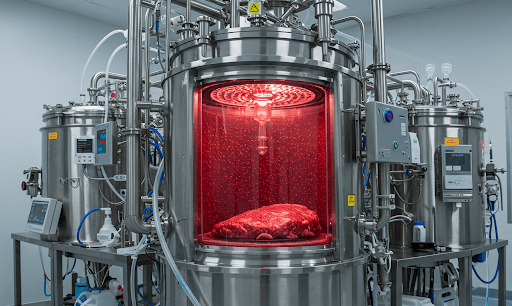Scaling Cultivated Meat: Israeli Startup’s Novel Bioreactor
SUSTAINABILITYALTERNATIVE PROTEINS


This is an AI generated illustration and does not represent actual product or service.
The cultivated meat industry is racing toward a future where lab-grown proteins can replace traditional animal agriculture without compromising taste, texture, or nutritional value. Israeli startup Ever After Foods Ltd has made a significant leap in this domain with its newly patent pending packed bed bioreactor technology. This innovation aims to revolutionize the large-scale production of structured cultured meat, offering a more efficient, scalable, and edible approach to tissue engineering.
Breaking Down the Patent: A New Era for Cultivated Meat
Ever After Foods' patent (WO2025/012910 A1) introduces a packed bed bioreactor specifically designed for growing structured meat tissues on edible scaffolds. The key technological advancement lies in the three-dimensional (3D) porous scaffold structures used to support the growth of animal cells, forming an edible cell mass that mimics traditional meat.
How It Works: The Science Behind the Innovation
The bioreactor is designed to optimize the uniform growth of cells by controlling nutrient distribution, oxygenation, and fluid flow. This ensures that cultivated meat products develop proper texture, structure, and density, addressing one of the key challenges in the industry.
Porous 3D Edible Scaffolds:
Made from plant-derived materials (such as fruit or vegetable extracts).
Feature controlled porosity (50%-99%) and pore sizes (20-800 µm) to facilitate cell attachment and growth.
Available in various shapes (fibers, spheres, sheets, etc.) to support different meat structures.
Packed Bed Bioreactor System:
Contains multiple scaffold structures arranged to allow even fluid distribution for nutrient flow and oxygen exchange.
Uses a continuous flow system to maintain ideal conditions for cell differentiation and growth.
Automated Monitoring and Optimization:
Sensors track key parameters (pH, oxygen levels, temperature, glucose consumption).
A control module adjusts conditions to maximize cell viability and tissue formation.
Vibration-Based Harvesting:
Inspired by prior research on 3D culture harvesting, the system uses gentle vibrations to detach mature cells without damaging them.
This ensures efficient, non-invasive collection of structured cultivated meat.
Why This Technology Could be a Game-Changer
1. Overcoming Scalability Challenges
One of the biggest hurdles in cultivated meat is the difficulty of producing structured tissues at scale. Traditional bioreactors are designed for suspension cultures, which work well for ground meat but fail to recreate the fibrous texture of whole cuts. Ever After Foods' packed bed bioreactor enables layered, structured tissue growth, making scalable whole-cut cultivated meat a reality.
2. Edible, Plant-Based Scaffolds for Better Integration
Many existing scaffold technologies use inedible biomaterials, requiring additional processing steps to remove or replace them. Ever After Foods' use of plant-based scaffolds eliminates this issue, allowing the cultivated cells to grow directly on edible fibers, mimicking the natural composition of meat.
3. Energy and Resource Efficiency
By optimizing fluid flow and cell attachment, this system reduces media consumption and increases cell yield per unit volume. The controlled bioreactor environment ensures that only essential nutrients are used, cutting down on energy-intensive waste.
4. Potential for Customization and Multi-Cell Cultivation
The system allows for the co-culturing of different cell types (e.g., muscle, fat, connective tissue), leading to a more natural meat composition. Additionally, it supports the use of different scaffold materials and shapes, making it adaptable for various cultivated meat textures.
What This Means for the Future of Cultivated Meat
The implications of Ever After Foods' technology extend far beyond the laboratory. This packed bed bioreactor could become a cornerstone technology for companies aiming to produce commercial-scale structured cultivated meat. With its focus on efficiency, sustainability, and scalability, it paves the way for cultivated meat products that match the sensory and nutritional properties of traditional meat—all without harming animals.
As the industry moves closer to regulatory approvals and mass-market availability, innovations like this could be the key to making cultivated meat an affordable, widely accepted alternative to conventional animal products.
About Ever After Foods
Ever After Foods, formerly known as Plurinuva, is an Israeli startup specializing in cultivated meat production. The company has developed a proprietary technology platform aimed at producing slaughter-free meats that prevent animal cruelty and support health, security, and sustainability for the planet and its people.
A spin-off from biotechnology pioneer Pluri Inc., Ever After Foods is backed by the Tnuva Group, Israel's largest food producer. The company utilizes a patented 3D cell expansion environment that mimics cells' natural habitat, allowing for cost-effective mass-scale production of cultivated meat with batch-to-batch consistency.
In June 2024, Ever After Foods secured a $10 million funding round to scale its patented technology, which aims to reduce both capital and operational expenditures in cultivated meat production. The company plans to build its B2B strategy by providing bioreactors and edible scaffolds to third parties, enabling them to use their own cell lines or collaborate with those developed by Ever After Foods.
